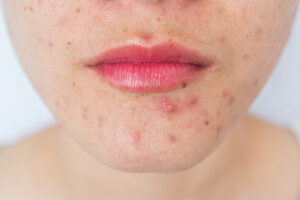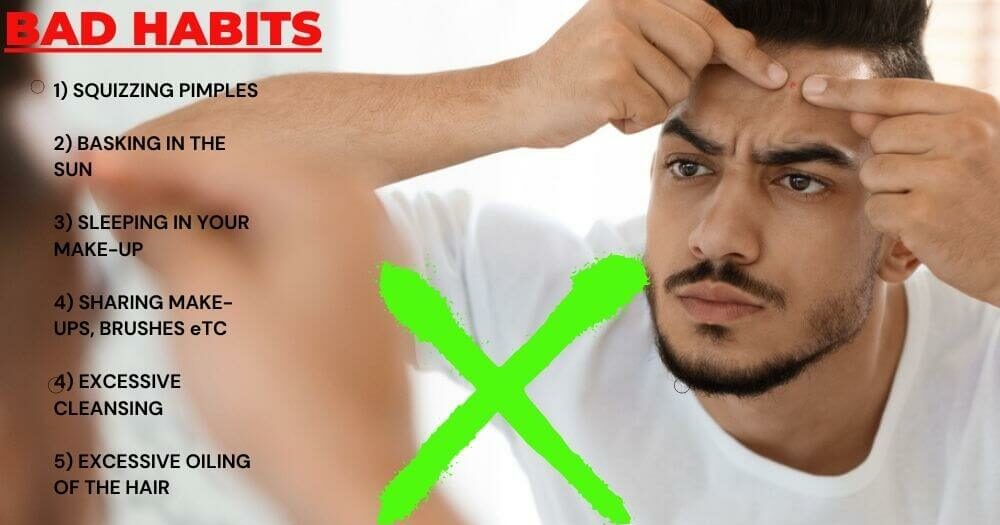[lwptoc]
Healthy Skin Care tips and Acne treatments are TWO aspects you need if you want to clear up your acne. You can’t disentangle one from the other, especially

if you are looking for a healthy skin care routine.
You may have a skincare product that works well for you but what about your skin care habits? You may be engaging in bad skin care habits consciously or subconsciously.
It’s time to trash bad habits that can make your acne worse. This is absolutely important as you also consider what treatment options are best for your skin.
In this article, I’ll show you 10 bad habits that have been proven to worsen acne.
1) Squeezing/picking/rubbing Pimples
Squeezing, popping, picking or rubbing your pimples is not a healthy skin care practice.
The temptation of squeezing, picking or rubbing your pimples might confront you but it’s necessary you DON’T.
Such practice aggravates your pimples, so resist the temptation of doing so.
Falling to resist this temptation may result in the following;
- Pushing back the content of your pimples – resulting in inflammation,
- Worsened painful acne
- Infected acne
- Increased post-inflammatory pigmentation or scarring.
Best Practice
- You may choose to go medical or organic. Apply acne medication or organic products for clearing up acne – For example, organic products containing tea tree oil can help with scarring, pigmentation and clearing acne.
- Your pimples can be surgically removed by your dermatologist under sterile condition – however this is expensive, takes time and not usually the first line of treatment.
- Talk to your dermatologist about your treatment option.
RELATED ARTICLE: Acne Facts And Myths – You’ll be Surprised!
2) Basking in the sun
While light and laser therapy carried out by your doctor have been shown to be effective in treating acne, EXCESSIVE exposure to sun is bad, period!
Whether you have natural tan (dark skin) or not, the effect cuts across the board.
The sun is the main source of Ultraviolet (UV) ray.
The effect of excessive UV ray can lead to the following;
- Skin damage
- Skin irritation
- Increased inflammation
- Worsening or causing acne
- Increased hyperpigmention
Best Practice
- Avoid hot weather and excessive sun exposure.
- Get yourself an acne-friendly (non-comedogenic) sunscreen that’s high in SPF – aim above SPF 15.
- Apply a suitable SPF (15+) facial moisturizer to help clear up acne.
- Visit your dermatologist for advise.
3) Sleeping in your make-up
Among females, make-up is a good way to cover your acne and boosts your confidence!
Some make-up products can aggravate acne.
However, it may SURPRISE you know that NOT all make-ups will make your acne worse. In fact, some make up products can help with reducing your acne.
Choose make-up products that are well-tolerated, non-comedogenic, non-allergenic and contain active ingredients that can help reduce acne.
Generally, sleeping in your make-up can;
- Clog your pores
- Increase number of inflammatory lesions.
- Aggravate your acne,
- Increase redness
- Cause bacterial infection
Best Practice
- Wash your face every night before going to sleep
- Use a suitable mild cleanser
- Use a suitable make-up remover
4) Sharing make-up/brushes/applicators
You can transfer acne causing bacteria and dead skin cells when you share make-up, make-up brushes or applicators.
Such practice can result in;
- Clogging of your pores
- Aggravation of your acne
- Other conditions such as pink eye or cold sore
Best Practice
- Just don’t share your make-up/eye shadows, make-up brushes or applicators
- Depending on how often you use your brushes, clean them every 2 to 3 weeks and ensure they are properly dry before use
5) Excessive washing/cleansing/scrubbing
- Excessive washing more than twice a day can result in aggravation of acne and weakening of skin barrier function.
- Scrubbing, washing or cleansing the face VIGOROUSLY can cause skin irritation and exacerbate acne.
- Use of soap can result in flare up of acne.
- Skin irritation includes redness, stinging, dryness etc.
Best Practice
- Use mild cleanser
- limit cleansing or washing the face to twice daily
- Avoid use of soap for washing/cleansing the face.
6) Excessive oiling of the hair
Oiling your hair is beneficial for managing your hair and scalp. However, excessively applying oil to your hair can
- Cause oil to drip onto the skin.
- Clog pores
- Lead to breakouts.
- Flare-up of acne
Best Practice
- Determine your hair porosity or type
- Oil your hair 1 to 2 times a week depending on your hair porosity or type
- Follow the manufacturer’s direction for frequency of oiling your hair based on your hair type.
RELATED (Product Review): 100% Pure Argan Oil -Best Oil for Skin & Hair?
7) Sweating
This is somewhat a controversial topic. Although there’s divided evidence regarding the link between sweating and exacerbation of acne on the back, chest and shoulder, it’s best to maintain good hygiene.
Exercising has numerous health benefits, so it’s unavoidable.
However, when you sweat and you let it sit on your skin, you you risk the following;
- Trapping of acne causing bacteria that reside in clogged pores
- Exacerbation of inflammatory lesions
Best Practice
- Shower as soon as possible – within 1 hour of finishing your exercise.
- Don’t rub of your sweat on your face during your workout – dab with a clean towel instead!
- Avoid humid conditions or minimize the effect of humid conditions (e.g. cooling system, shower)
- Wash your face immediately after sweating to prevent breakouts
8) Excessive use of Cosmetics
Cosmetics – weather pharmaceutical or organic are beneficial in treating skin conditions. It’s counter productive when you use cosmetics excessively, change skincare products frequently – i.e. weekly, use inappropriate or harsh cosmetics. Also apply heavy, inappropriate make-up is bad.
The following can result from such practice;
- Disruption in skin barrier function – predisposing you to skin problems
- Acne cosmetica – a mild but persistent form of acne
- Clogging of pores
- Skin irritation
- Increased risk of allergies, sensitivity or adverse effects due to many harsh ingredients
- Worsening of your acne.
Best Practice
- Keep it simple
- Avoid trying one acne treatment every week
- Use appropriate skincare product to treat your acne – give it time to work (improvements can be seen between 4 to 8 weeks and complete clearing in 3 to 4 months).
- Use good quality skincare products that are well tolerated.
- Apply light make-up and gently – to avoid irritating your skin
- Unsure? Consult your dermatologist.
RELATED ARTICLE (Product Review): Best Probiotic Moisturizer – Eminence Skincare Review
9) Rubbing alcohol on your face
Alcohol can cause drying out of the skin, there by irritating it. This can lead to
- Pimples’ breakouts
- Aggravate your acne
- Disrupt your skin barrier function
Best Practice
- Avoid rubbing alcohol on your skin or any astringent that will dry out your skin.
- Use products that are free of alcohol.
- Use moisturizers that are made for acne or acne prone skin twice a day or as directed after cleansing your face.
10) Applying concentrated essential oil on your face
You might be tempted to apply concentrated essential oil directly on your skin because you have heard that it’s great for the skin. Actually, applying concentrated essential oil directly on your skin is bad for your skin health. This can result in;
- Irritation to your skin
- “Breakouts”
- Exacerbation of your acne
Best Practice
- Make sure it’s diluted in a suitable carrier oil that won’t clog your pores.
- Choose a suitable, good quality skincare product containing essential oil (e.g. tea tree oil) that can treat acne.
Differences between Acne and Pimples – 5 FACTS you should know about
You may have noticed that I used pimples and acne interchangeably. I thought I’d share with you the differences with some interesting facts!
Fact #1: Acne Vulgaris (commonly known has acne) is EXPRESSED as pimples! .
Fact #2: Pimples are “breakouts” while acne is when you experienced recurring and persistent pimples.
In other words, acne is a condition while pimples (not a condition in itself) are types of acne lesions.
Fact #3: Pimples/Acne have two categories – non-inflammatory and inflammatory pimples
Fact #4: Non-inflammatory pimples are whiteheads and blackheads – known as comedones.
Fact #5 Inflammatory pimples are papules, pustules, nodules and cysts
RELATED ARTICLE: What’s the main cause of acne – a precise and clear understanding
I like to hear your thoughts. Leave your comment below and I’ll get back to you ASAP.
References
American Academy of Dermatology Association. (2021). I have acne! Is it okay to wear makeup. I have acne! Is it okay to wear makeup? (aad.org)
American Academy of Dermatology Association. (2021). Pimple popping: why only a dermatologist should do it. Pimple popping: Why only a dermatologist should do it (aad.org)
Elman, M. and Lebzelter, J. (2004), Light Therapy in the Treatment of Acne Vulgaris. Dermatologic Surgery, 30: 139-146. https://doi.org/10.1111/j.1524-4725.2004.30053.x
